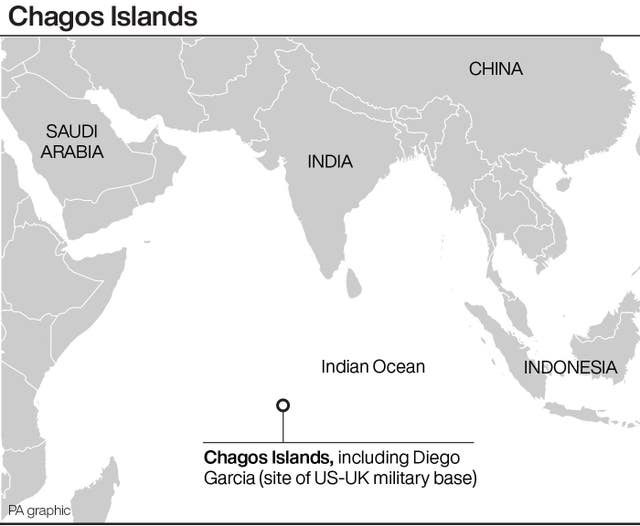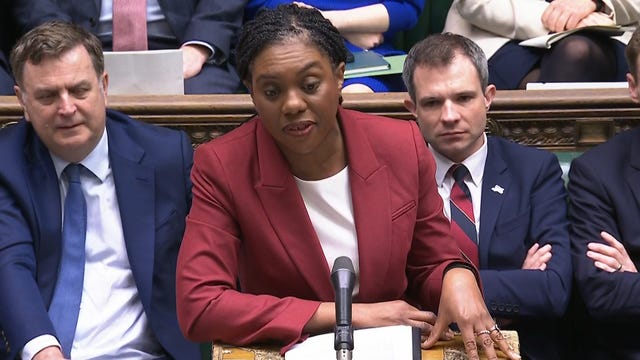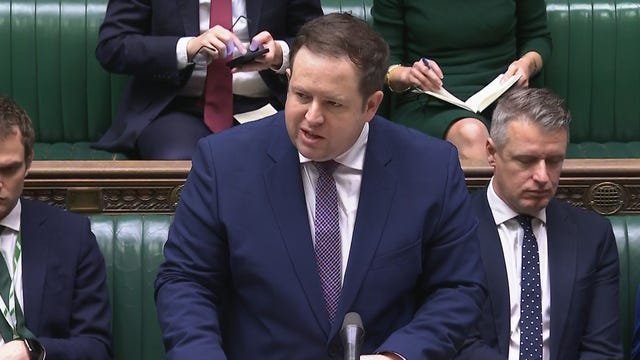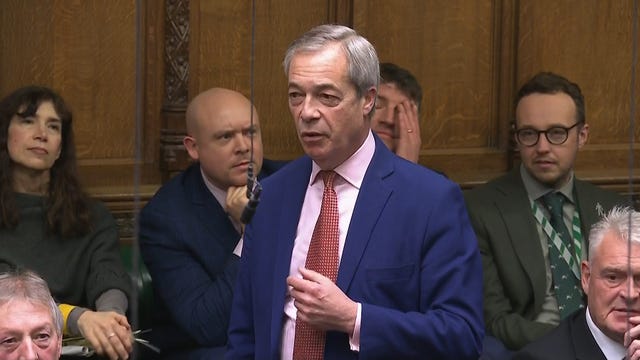Starmer: Chagos deal necessary to give legal certainty for Diego Garcia base
Sir Keir Starmer clashed with Tory leader Kemi Badenoch over the deal to hand over the Chagos Islands to Mauritius.

National security will be put at risk unless the Chagos Islands are handed over to Mauritius in a deal set to cost the UK taxpayer billions, Sir Keir Starmer said.
The Government plans to cede sovereignty over the British Indian Ocean Territory but pay to lease back the strategically important US-UK military base on Diego Garcia.
Ministers believe international legal rulings on the status of the archipelago put the operation of the airbase and port facility in doubt.
A deal has been reached with the Mauritian government to hand over the territory and lease back Diego Garcia at a reported cost of £90 million a year – or almost £9 billion over the 99-year term of the agreement – although the Government has not confirmed any figure.
And the UK flatly denied suggestions that the cost could spiral to £18 billion after the Mauritian Prime Minister Navin Ramgoolam said payments would be inflation-linked.
At Prime Minister’s Questions – in response to Tory leader Kemi Badenoch’s claim the plan is an “immoral surrender” – Sir Keir said Diego Garcia is “vital to our national security” but “a number of years ago the legal certainty of that base was thrown into doubt”.
“Without legal certainty, the base cannot operate in practical terms as it should,” he told MPs.
“That is bad for our national security and it’s a gift for our adversaries.”
Sir Keir pointed out to Mrs Badenoch that negotiations on sovereignty over the British Indian Ocean Territory began under the Conservatives and said “some within the party opposite know exactly what I’m talking about” in his references to security implications.

The secretive base is used by nuclear-capable US bombers and nuclear-powered submarines.
Sir Keir suggested Mrs Badenoch has not been fully briefed about the issues and has not requested information on the Chagos Islands from him.
He said that if the Leader of the Opposition was properly briefed “she knows exactly what I am talking about in terms of national security and legal certainty” but if not “she’s not fit to be prime minister”.
A spokesman for Mrs Badenoch said Sir Keir was “playing politics with national security” and the Prime Minister’s comments were “a distraction technique”.
The spokesman said: “Kemi Badenoch sat in the Cabinet until six months ago, she talks to (former foreign secretary) James Cleverly, she knows the details behind this case.
“That does not preclude her from pointing out that spending £18 billion to give away our own territory is an utter disgrace.”

Mr Cleverly, who was in the Foreign Office when the negotiations started, said he had the same information as the Government and neither he nor successor Lord Cameron had struck a deal to hand over the islands.
“The point of a negotiation is not to get any deal but to get a good deal, and if you do not get a good deal, then you should walk away from the table, as we did,” Mr Cleverly said.
A deal was originally announced in October 2024 between the Labour government and the previous administration in Mauritius.
The current Mauritian prime minister, Mr Ramgoolam, told his country’s National Assembly on Tuesday that he has rewritten the deal to ensure payments from the UK rise in line with inflation and to give his country an effective veto on extending the terms of the agreement beyond 99 years.
He suggested not linking payments to inflation would have halved the amount heading from UK taxpayers to Mauritian coffers.
On Wednesday, the Mauritian government issued a statement clarifying Mr Ramgoolam’s comments, insisting it had not claimed that the cost of the deal would double.

It said the negotiations had also “clarified and firmed up the unequivocal understanding that any extension would need to have the consent of Mauritius and the UK”.
The statement confirmed that following the renegotiation under Mr Ramgoolam “the parties had agreed on an improved agreement on mutually acceptable terms”.
Foreign Office minister Stephen Doughty told MPs in Westminster: “The comments of the prime minister of Mauritius are for him to make. There has been no change to the substance of the deal, nor the overall quantum agreed.
“We believe we have achieved a deal that’s in the interests of the UK and Mauritius and, indeed, of the United States and our allies.”
He suggested that the security of communications could be jeopardised if a deal was not reached to secure the legal status of the base.
“We currently have unrestricted and sole access to the electromagnetic spectrum which is used to communicate with satellites and which is guaranteed and governed by the International Telecommunication Union, a United Nations body based in Geneva,” he said.
“If we lose it we can still communicate, but so can others. ”

The plan to give up sovereignty and lease back the base was backed by former US president Joe Biden, but Donald Trump’s administration has not yet given its support.
Reform UK leader Nigel Farage, an ally of the US president, told MPs the future of Diego Garcia has not been “high on their agenda” in the early days of the new administration.
But, he warned, “when the Americans wake up to the fact that this has been done wholly unnecessarily” the Trump government could respond with tariffs on UK goods.
He argued that the International Court of Justice’s advisory decision on sovereignty in 2019 has “no force of legal power whatsoever”.
Mr Trump’s secretary of state Marco Rubio has previously raised concerns, saying the deal poses a threat to US security because of the influence of China in the region.
But Mauritius is one of only two African nations not to have signed up to Beijing’s Belt and Road Initiative and is a close ally of India.





